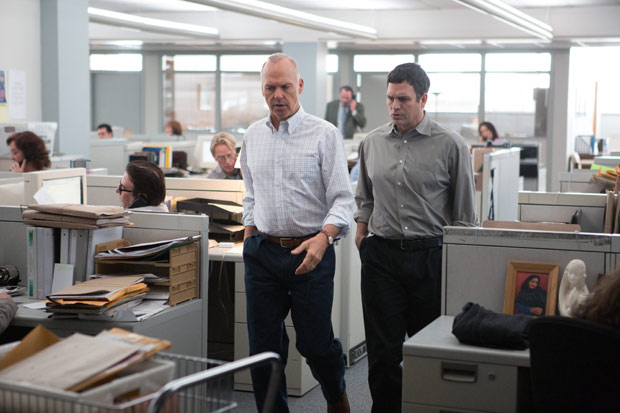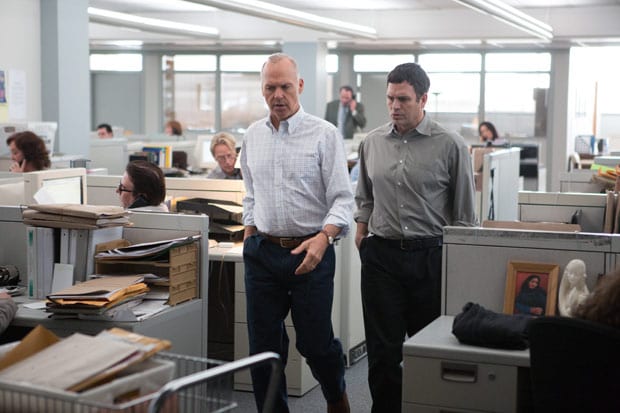‘Spotlight’ shines on the dark corners of a conspiracy

ARNOLD WAYNE JONES | Executive Editor
jones@dallasvoice.com
In the summer of 2001, “Google” was not yet a verb, Osama bin Laden was alive and not on every American’s enemies list, Justin Bieber was still confined to Canada and the legacy newspaper industry still had some muscle. In fact, despite worries that “this new Internet thing” might trigger staffing cuts and decreases in revenue, editorial integrity was still a thing (TMZ and Buzzfeed were five years away). That’s the important context you need to know going into Spotlight, a film likely to get loads of loving reviews from journalists (including this one) who think to themselves, “Yeah, that’s the profession I’m a member of!” even as we work on stories like “Six things not to put in your Grindr profile.”
 The film is set mostly in the newsroom of The Boston Globe. A new editor (Liev Schreiber, in his most restrained performance to date) — Jewish and an outsider — has come to run the large daily in the vastly Catholic and insular New England capital. He’s not one to go-along-to-get-along, and so when he hears about a potential story — that Catholic priests, who have been known to molest parishioners, may be the tip of a conspiracy that could go as high up as the archdiocese’s Cardinal Bernard Law — he sets his investigative unit, Spotlight, on the trail of the story. The team’s editor, Robby (Michael Keaton, who could be in a run again for an Oscar), is skeptical about the decision — how will readers react if the paper of record is perceived of as targeting a beloved institution — but he also knows a good lead when he hears one. He sets his team (Mark Ruffalo, Rachel McAdams, Brian D’Arcy James) on the story.
The film is set mostly in the newsroom of The Boston Globe. A new editor (Liev Schreiber, in his most restrained performance to date) — Jewish and an outsider — has come to run the large daily in the vastly Catholic and insular New England capital. He’s not one to go-along-to-get-along, and so when he hears about a potential story — that Catholic priests, who have been known to molest parishioners, may be the tip of a conspiracy that could go as high up as the archdiocese’s Cardinal Bernard Law — he sets his investigative unit, Spotlight, on the trail of the story. The team’s editor, Robby (Michael Keaton, who could be in a run again for an Oscar), is skeptical about the decision — how will readers react if the paper of record is perceived of as targeting a beloved institution — but he also knows a good lead when he hears one. He sets his team (Mark Ruffalo, Rachel McAdams, Brian D’Arcy James) on the story.
Six months later, when Spotlight published its first of 200 articles about widespread sex abuse among the clergy, all the effort proved worth it; the Globe later won a Pulitzer Prize for investigative journalism.
It’s an inspiring tale to be, sure, but if Spotlight were just some masturbatory good-ol’-boy’s movie, backslapping journalists for being brave, it would not resonate with half the power it does. Director/ co-screenwriter Tom McCarthy pulls as much from The Verdict as he does All the President’s Men; there’s a compelling mystery at the heart of Spotlight, one that the Globe staffers, in 2001, can’t fully bring themselves to embrace. All lapsed Catholics, even they can’t quite imagine the emotional wallpaper that is the church could have betrayed not just them, but vulnerable children … and in the most shocking ways possible. It gives shape to Nietzsche’s aphorism, “If you gaze long into the abyss, the abyss will also gaze into you.”
McCarthy lets nuance and subtlety (a quick glance at an adult victim’s needle marks, a pained, suppressed reaction by the reporters upon hearing horror after horror recounted to them and trying to remain objective) do all the heavy lifting. There’s no need to be mawkish when the facts speak for themselves.
Indeed, the film is at its most predictable when Ruffalo — usually among the most laconic of actors, but squirrelly and fidgety here — becomes indignant at the idea of getting the story correct, not just quick. It’s a lesson countless journos in the current environment could take to heart.
While Keaton is largely the fulcrum of the story (a third-act confrontation with a source produces chills), this is an ensemble piece filled with lovely supporting performances (Schreiber and McAdams, but also Michael Cyril Creighton as a gay man victimized by a priest) that creates an authentic universe in which very human people do their best to make a difference. It’s the fall’s best film to date.
This article appeared in the Dallas Voice print edition November 13, 2015.

